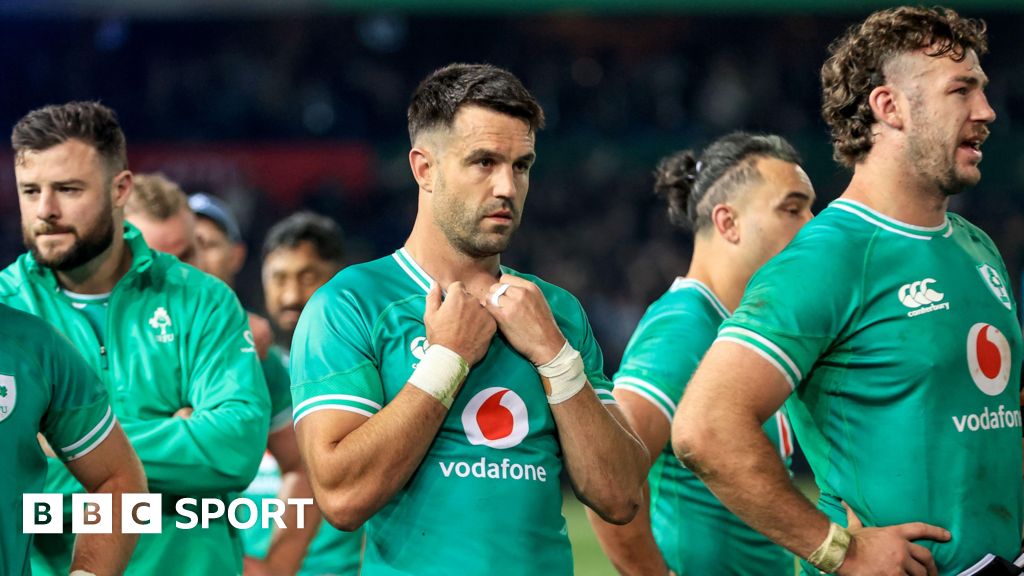- Author, Jonathan Bradley
- Role, BBC Sport NI Journalist
In Ireland’s two most recent southern hemisphere tours, series victories were secured despite losing the first Test.
Against Australia in 2018 and New Zealand in 2022, the visitors looked sluggish off the plane only to regroup and regather across the remainder of their three-game tilts to ultimately secure significant triumphs.
In South Africa this time around, there is no such luxury.
At the end of this gruelling World Cup season, matters are to be decided across 160 minutes – and already a split is the best Ireland can hope for.
Knowing that only their best would likely be good enough on a ground where just one northern hemisphere team has won since South Africa’s re-entry to international rugby in 1992, Ireland were slow out of the blocks at Loftus Versfeld and the World Cup winners were deserved victors.
After a 27-20 loss that came courtesy of a decidedly rusty first half, Andy Farrell’s side are left with no margin for error if they are to salvage anything from this series against the number one-ranked side in the game.
The Ireland head coach was pleased by the character shown by his side to stay in the Test while below their best and can perhaps take encouragement from his side’s substantial room for improvement.
‘Counting the cost of defeat’
Now in Durban, and back at sea level after playing Saturday’s Test in the altitude of Pretoria, Ireland’s first port of call will be to assess the toll of their defeat in the opener.
Already travelling without Hugo Keenan, Jamison Gibson-Park, Jack Conan and Iain Henderson, the visitors appeared to suffer a further raft of injuries.
Robbie Henshaw and Dan Sheehan were both replaced at half-time, while Craig Casey and Jamie Osborne departed in the second half, the former stretchered off after striking his head on the turf.
In the absence of Gibson-Park, and with Casey now almost certainly out, Connacht scrum-half Caolin Blade is likely to be promoted to the match-day squad and add to his previous two caps.
Although Ireland’s squad already felt stretched through absentees, Farrell will take solace from the performance of Garry Ringrose when called upon in the second half, while Ronan Kelleher is certainly an able deputy at hooker should Sheehan miss out.
Against arguably the widest talent pool in the game however, any loss of depth is sure to be keenly felt.
‘Cut out mistakes that undermined performance’
Farrell described his side as “off” in the immediate aftermath of the defeat and, while the Springboks were certainly deserving of their win, Ireland will rue the fact that two of their opponent’s three tries were wholly avoidable.
Kurt-Lee Arendse’s opener was a fine team score with new attack coach Tony Brown’s stamp all over it, but South Africa won the game off the back of Ireland errors.
After Rassie Erasmus had introduced his ‘Bomb Squad’ from the bench, a South Africa scrum penalty was aimed towards the corner. Handre Pollard’s touch-finder looked to be coming up short but James Lowe’s gamble failed to pay off as his attempt to knock the ball infield set Cheslin Kolbe on the way to a score.
The Leinster wing, who created Jamie Osborne’s first-half score and had one of his own chalked off by the TMO, had another serious misjudgement in the final minutes as he misplayed a restart that had looked set to go dead, giving South Africa the scrum that ultimately led to a crucial penalty try.
Lowe’s mistakes, leading as they did to scores, loomed the largest but the error count was too high across the board. Ireland are rarely this untidy, but will know any repeat in Durban this week will again make any win nothing more than a longshot.
‘Sharpen up their attack’
Attacking off a goal-line drop-out, Conor Murray’s late try for Ireland showed their inventiveness in what is becoming akin to another set-piece. There was a lot to admire in the scores provided by Leinster duo Jamie Osborne and Ryan Baird too.
By and large, however, Ireland struggled to get purchase in attack across the 80 minutes.
Mistakes and handling errors were certainly one element in Ireland’s failure to build a head of steam when in possession.
But it would be foolish to overlook how the sheer size of the South Africa side, with former Munster centre Damian de Allende offering a few prime defensive examples, hindered Ireland on the gainline too.
Ireland are at their best when there is a precision to their attacking breakdown, something that was too often lacking in Pretoria but will need to be in evidence this weekend.

